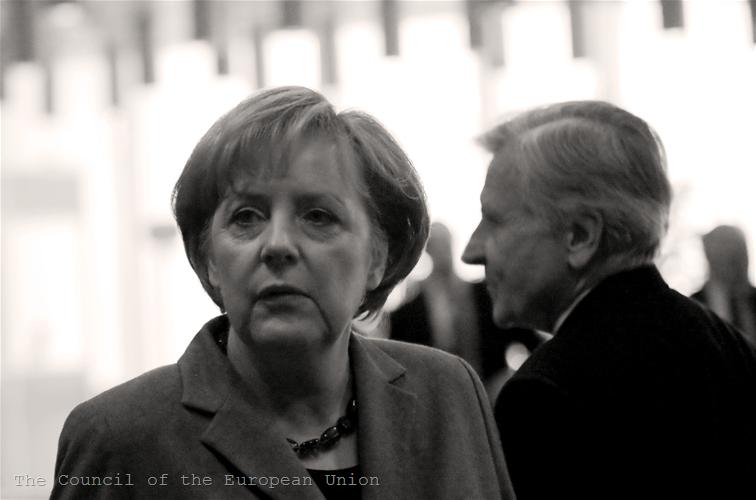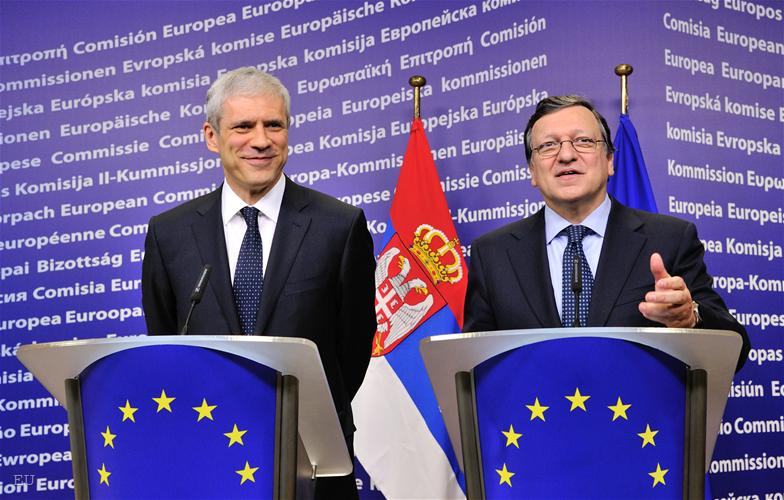G20 to the EU: You Are Doing Just Fine on Your Own!
Adelina Marini, February 29, 2012
 The conclusion from the meeting of the finance ministers and central bankers of the G20 countries on Saturday and Sunday is that Europe is doing great on its own and can continue in the same spirit, by securing, however, a little bit more money for a reserve to be able to assist countries in troubles. This conclusion stems from the communique from the meeting, as well as from the messages the European representatives conveyed in Mexico on February 25-26 - Olli Rehn, EU Monetary Affairs Commissioner, Mario Draghi, President of the European Central Bank and Margrethe Vestager, Danish Minister of Economy and the Interior. One of the big goals of the meeting was the EU to receive a concrete commitment from its G20 partners to be more financially involved with the so called firewall of the eurozone, to enable it to endure a rescue of other countries in case of a need.
The conclusion from the meeting of the finance ministers and central bankers of the G20 countries on Saturday and Sunday is that Europe is doing great on its own and can continue in the same spirit, by securing, however, a little bit more money for a reserve to be able to assist countries in troubles. This conclusion stems from the communique from the meeting, as well as from the messages the European representatives conveyed in Mexico on February 25-26 - Olli Rehn, EU Monetary Affairs Commissioner, Mario Draghi, President of the European Central Bank and Margrethe Vestager, Danish Minister of Economy and the Interior. One of the big goals of the meeting was the EU to receive a concrete commitment from its G20 partners to be more financially involved with the so called firewall of the eurozone, to enable it to endure a rescue of other countries in case of a need.
The big controversy, though, was and as it seems still is, is whether the EU to increase the size of the firewall first and only then the G20 to provide money. The eurozone firewall is in fact the two rescue funds - the temporary European Financial Stability Facility (EFSF) and the permanent European Stability Mechanism (ESM), which was initially planned to take over from the temporary fund from July 2013 but the EU leaders have agreed in December the ESM to start operations yet this year.
The goal is the two funds to combine their resources, thus reaching a combined lending capacity of 750 bn euros and with the G20 support the joint "power" of the firewall to reach 1 trillion euros. The leaders have also agreed to reassess in March whether this combined lending capacity would be sufficient to endure a blow of the size of Italy, for instance. According to Germany, there is no need of increasing the firewall. According to everybody else - there is.
Britain, USA and Japan insist the EU to first increase the lending capacity of the rescue fund and only then to undertake efforts of increasing the IMF resources. In a letter, published in The Financial Times before the meeting in Mexico, George Osborne, Britain's finance minister, and his Japanese counterpart Jun Azumi state very clearly that, given the fact that for the IMF the biggest risk for global growth would be the eurozone crisis, then any greater involvement of the Fund in solving the crisis must be under conditions of the Fund. And another very important thing, according to the two ministers - the additional resources for the IMF must come from a broad range of countries, which means not only from those that sympathise stronger with the euro. "Crucially, IMF resources cannot be a substitute for further steps by the eurozone to support its currency. The eurozone must increase the resources of its firewall so the markets can be reassured that it can respond to any eventuality", Osborne and Azumi write.
This means that Japan and Britain (USA too) imagine the increase of IMF resources more or less as something similar to guarantees for the eurozone and not that much in terms of money to be spent as an IMF contribution in the bailout programmes of the euro area. For example, in the current bailout programmes (Greece, Portugal and Ireland) IMF's share is one third. Very indicative about the moods of some countries, however, was IMF's reticence demonstrated during the negotiations of the second Greek bailout programme. Of the total 130 bn euros agreed, IMF's share is about 13 bn euros or one tenth, although this is an unofficial number. Officially it is being talked about a "significant participation" (in the Eurogroup statement), but in the words of IMF chief, Ms Christine Lagarde, significant means a lot of things.
In the G20 communique the countries readiness is stipulated as follows: "Euro area countries will reassess the strength of their support facilities in March. This will provide an essential input in our ongoing consideration to mobilise resources to the IMF". In other words - help yourselves first and then we'll see. In general the tone of the communique speaks of confidence that the situation in the eurozone is stabilising and that the measures undertaken by the EU leaders and the member states deliver. "Substantial policy actions have taken place since our last meeting [November 2011], and recent economic developments point to the continuation of a modest global recovery and an easing in global financial market stress".
The G20 ministers welcome all the actions undertaken by far, including the deal for Greece, as well as the interference of the European Central Bank in December, when it poured liquidity for the European banks. The Twenties' concern is that the forecasts for the economic growth in 2012 are modest and there are big downside risks, which can be clearly seen in the revised interim forecast of the European Commission, presented last week by Commissioner Olli Rehn.
How did the EU interpret the G20 support?
Mr Rehn shared that in the past 24 hours [Saturday and Sunday] he felt a much more positive atmosphere among the partners in the Group. He admitted that the firewall was a central topic at the meeting but pointed out that it had already been increased with the entering into force of the permanent mechanism from July this year, instead of July next year. "Moreover, the European leaders will reassess the adequacy of the lending capacity of the two funds in March and I believe that they will decide to enhance it in order to better respond to market turbulences. We also expect a decision for an increase of the IMF resources, as it is preferable this to happen during the spring  meeting of the Fund". The monetary affairs commissioner underscored that this decision should not be postponed any more and that more efforts were needed to anchor stability.
meeting of the Fund". The monetary affairs commissioner underscored that this decision should not be postponed any more and that more efforts were needed to anchor stability.
The Danish minister of economy and the interior, who took part in the meeting in her capacity of a representative of the Danish Presidency of the Council of the EU, recalled that at their December summit the EU leaders committed the eurozone countries to increase their resources in the IMF in the form of bilateral loans, amounting to 150 bn euros, and the countries outside the monetary union have committed to contribute with additional 50 bn euros. It seems, however, that this is not enough for the influential countries in the IMF, like USA, Britain and Japan, which suffer severe budget difficulties. Olli Rehn said that he was very pleased with the outcome and added that a roadmap was drawn to enhance the resources, which can only mean that consent has been achieved but something more specific is awaited.
The issue of increasing the size of the euro area firewall will be central at the Spring European Council, which starts on Thursday in Brussels. Although at this stage all European leaders claim that no new countries from the eurozone have to be bailed out for now or no new rescue efforts need to be repeated of already living in bailout mode countries, there are growing concerns not only on the financial markets. The Portuguese press wrote in the end of last week that because of the recession (according to the European Commission forecast Portugal's economy will shrink by 3.3% this year) the risks are growing Lisbon to request a second bailout loan.
 The pressure over German Chancellor Angela Merkel to reconsider its position about the increase of the rescue fund of the eurozone has increased last week by the diplomatic efforts of Irish PM Enda Kenny, whose country is also in a bailout mode. After on Thursday he dined with her in Berlin, on the next day he met the Italian premier, Mario Monti. It was exactly the size of the firewall that they discussed. Monti is a supporter of the idea the rescue fund to be increased and besides he emerges as a very influential figure in the European politics. To the question whether Ms Merkel had responded to the arguments, outlined by the Irish prime minister, Enda Kenny said: "She listened very carefully". According to Reuters, Germany had shifted its position and is now more inclined to support combining of the resources of the two funds, which means a resource of 750 bn euros.
The pressure over German Chancellor Angela Merkel to reconsider its position about the increase of the rescue fund of the eurozone has increased last week by the diplomatic efforts of Irish PM Enda Kenny, whose country is also in a bailout mode. After on Thursday he dined with her in Berlin, on the next day he met the Italian premier, Mario Monti. It was exactly the size of the firewall that they discussed. Monti is a supporter of the idea the rescue fund to be increased and besides he emerges as a very influential figure in the European politics. To the question whether Ms Merkel had responded to the arguments, outlined by the Irish prime minister, Enda Kenny said: "She listened very carefully". According to Reuters, Germany had shifted its position and is now more inclined to support combining of the resources of the two funds, which means a resource of 750 bn euros.
The ministers of finance and the central bankers of the eurozone will meet again in April in Washington. By then the EU has to decide how to act this time, because past experience shows that the EU preferred to deny to the very last moment the need of money and when it finally secured it it never proved sufficient. May be it is high time to reassess not whether the lending capacity would be enough but to face the realities and to see whether and when this capacity might become needed. To a similar question in Mexico over the weekend Olli Rehn answered like this: "It is better that we act preventively rather than correctively".
 | © The Council of the European Union
| © The Council of the European Union | © The Council of the European Union
| © The Council of the European Union | © EU
| © EU